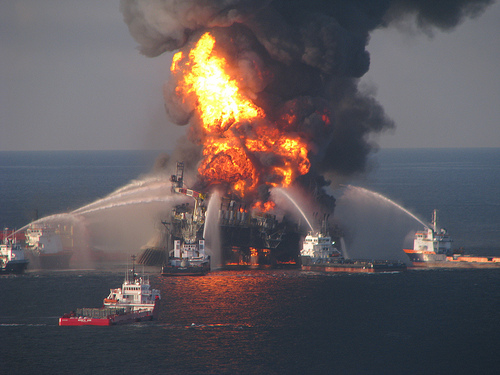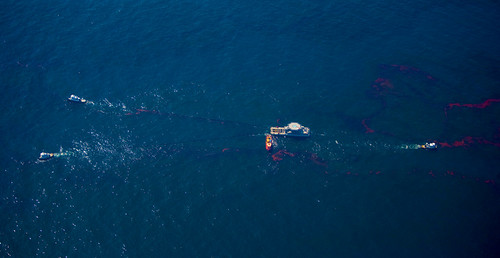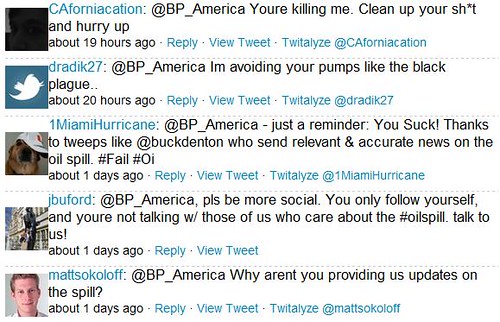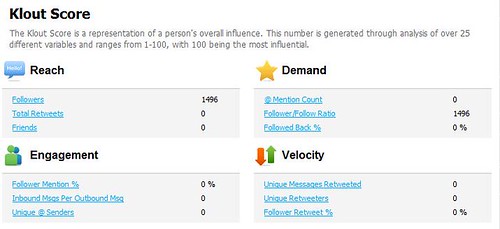BP are now caught in the middle of the worst possible scenario – one of the company’s oil drilling rigs in the Gulf of Mexico exploded on April 22 and sunk, resulting in a major environmental disaster as more than 5,000 barrels of oil leak into the ocean per day. The long term reputation of the company is at stake because of the accident, that in many instances has been labelled “the BP oil spill”. On the EPA site, for example, it is called “the British Petroleum Oil Spill” and even the link to the site is http://www.epa.gov/bpspill/. As the Star Phoenix notes, “in PR circles, if a disaster gets named after your company, this is a bad thing”.
This is obviously a horrible situation, on so many levels, and I don’t envy the people at BP that have to handle communication during this tough time. And nowadays, crisis management has extended into social media and it is a parameter a company need to integrate into its communication strategy.

As one would expect, BP is taking a severe beating in social media right now, when consumers vent their frustration with the effects of the disaster. On Twitter, thousands of tweets are currently being published mentioning BP in connection with the oil spill. Many of them are also directly addressing BP’s US corporate Twitter account with angry comments, suggestions and questions.
However, BP are not responding to any of those comments. In fact, the company does not communicate much at all via @BP_America. The account does not respond, retweet or follow anyone else on Twitter (see Klout score below), making it a pure one way communication channel. On top of that, the few tweets that are being published are press releases syndicated to Twitter via Twitterfeed. Nothing wrong with that, but if you publish press releases on your site in capital letters, it doesn’t land well on Twitter, where it equals SHOUTING!
I don’t want to point fingers at BP for not using Twitter to its fullest potential in this difficult position. Instead, why not point to other stakeholders in this catastrophe that are doing things well?

For example, the US Coast Guard has a Flickr account where it publishes photos and images under Creative Commons license. Images are displayed on http://www.deepwaterhorizonresponse.com/ as a slide show. In the menu of the site, there is even a section for “Social Media” which points to the U.S. Coast Guard’s presence on Facebook, Twitter and Flickr. Update: I forgot to mention that this site is being maintained by British Petroleum, Transocean, the U.S. Coast Guard, the National Atmospheric and Oceanic Administration, the U.S. Department of Homeland Security and the U.S. Department of Department.
The US Environmental Protection Agency, EPA, also uses social media. Administrator Lisa Jackson responds on Facebook and Twitter. I’m sure there are many more examples. The problem for a company in a crisis, especially when you are already in the “bad guy” position, is that when you leave an entire arena to your opponents, the damage to your brand in the long run may be worse than it would have to be. Facebook has more than 400 million members and that’s a big channel to leave unattended. If you do a search for “BP oil”, the first hit you get is the group Boycott BP Oil. As a contrast, the BP America Facebook page has not been updated since Feb 18, 2010. In other words, there is room for improvement.
Photo credit: http://www.flickr.com/photos/uscgd8/


So sad indeed. Whats even sadder is you can count on fuel prices going up, they might as well make a profit on their screw up!
What is galling is that BP has immodestly promoted themselves as being responsive and innovative. Their use of social media is anything but. Since BP clearly has no social media strategy and no clue how to use Twitter, we are collecting ideas for them at: http://bit.ly/benQw2
Yes BP does seem to be neglecting the social media side. The most visible person seems to be the CEO of BP on the television news – he is communicating the right message about taking action but I think that what this instance demonstrates is that in a crisis other forms of communication can be neglected. BP should understand that whilst the message being communicated by their CEO is on the whole a good message to communicate during a crisis – this message can be lost or distorted in the lively domain of social media.
It’s so sad. I was wondering how BP is reacting, thank you for letting us informed. Surprisingly BP is applying a one way communication model to tackle this huge crisis, but it doesn’t seem that they had a proper crisis manual just in case one of this situation arises. It seems that they want to give the impression is under control using their CEO, but we don’t they use social media to communicate openly? A clear example that sometimes silence gives consent.
To close the oil spill … in the gulf U.S.A
There is a device … I don’t know the name but … I explaine ……..
They make small fishes …. And things like that ….
You putt them in a glass of water ..And they come very big …..
Why you don’t use this stuff (( afew tons )) to close the ole in the bottum ….
I hope that my idea wiil help you ….
Good luck
André Breton Québec canada 1 418 877-7376
I have been trying to reach the IDIOTS at B P for a week. I KNOW how to stop the leaking well in the gulf. I worked for a company that stopped leaks in DAMS……..
inject “FERMINITE” into the well. it hardens to a concrete like when exposed to WATER !
someone call the Prez for me!
My name is Matt. I work at bp in Indiana I am so ashamed to be working for this company especially when bp arent doing anything about it. Im seriously thinking about quitting my job. Let me know what I should do.
Well if BP can’t stop the leak with golf balls, mud, or rope, maybe MY SONG will stop the leak. It’s just as likely as some of the crap they have already tried.
http://www.youtube.com/watch?v=IGy4QzMhTb8
I had a strong urge to leave the lyric “Mr. Hayworth should be shot dead” in there….alas I took it out.
What BP_America tweets about (as well as presses in interviews) is how much oil they get up. Like oil production would make them some kind of heroes.
BP has been hounded – but tell – me – who granted the licence to drill so close to shore ??
Who is benefitting from the exploration. Its time Federal Government stood up and took some responsibility for allowing the drilling in the first place.
Hopefully President Obama will also think of his brothers and sisiters in NIgeria and ensure that a similar fund is set up for the inhabitants of the Niger Delta whose lives have been wrecked by US exploration and extraction – the latest leak being from an Exxon/Mobil pipeline.
On 1 May this year a ruptured ExxonMobil pipeline in the state of Akwa Ibom spilled more than a million gallons into the delta over seven days before the leak was stopped. Local people demonstrated against the company but say they were attacked by security guards. Community leaders are now asking for $1bn in compensation for the illness and loss of livelihood they suffered. Few expect they will succeed. In the meantime, thick balls of tar are being washed up along the coast.
With 606 oilfields, the Niger delta supplies 40% of all the crude the United States imports and is the world capital of oil pollution. Life expectancy in its rural communities, half of which have no access to clean water, has fallen to little more than 40 years over the past two generations. Locals blame the oil that pollutes their land and can scarcely believe the contrast with the steps taken by BP and the US government to try to stop the Gulf oil leak and to protect the Louisiana shoreline from pollution.
Come on America – stop being so two faced and get real – and start recompensing your ancestors from whom you have stolen so much.